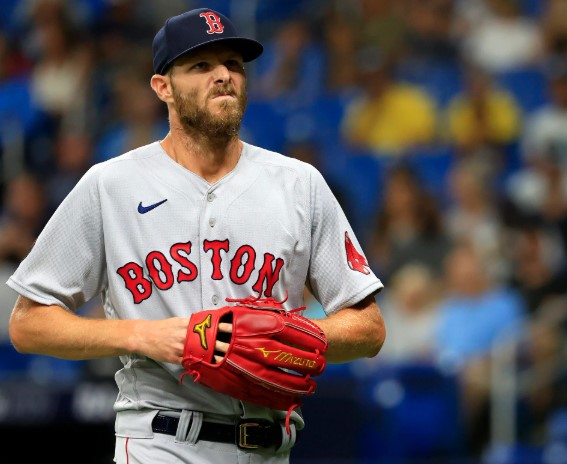Some Pitches Don’t Show Up in the Game”: Chris Sale, a Shaved Head, and a Promise to a 9-Year-Old Fighter
By [Your Name]
BOSTON — The letter was written in blue marker on lined notebook paper, each letter big and wobbly, the kind you’d expect from a nine-year-old.
“Dear Chris Sale,
I can’t play baseball because I have leukemia, but when I watch you throw the ball so hard, I feel like maybe I can fight cancer hard too.”
The letter was signed “Mikey,” with a smiley face drawn in the corner. It arrived in the mailroom at Fenway Park on a cloudy Tuesday, tucked between bills and fan requests. Chris Sale picked it up, read it once, then again, then folded it carefully and put it in his locker.
He didn’t tell anyone. Not the coaches, not the clubhouse guys, not the media waiting for a quote on his next start. Instead, he quietly made a plan.
“Some pitches don’t show up in the game,” Sale would later say. “But they matter more than any strikeout you’ll ever get.”
A Quiet Visit, a Loud Statement
Sale had been to hospitals before for charity events, smiling for photos, signing baseballs, telling kids to stay strong. But this was different.
On a rainy Thursday morning, Sale walked into Boston Children’s Hospital without a camera crew or a PR team. He wore a simple hoodie, a Red Sox cap pulled low, and in his hand was the letter.
He asked for Mikey’s room.
When he walked in, Mikey’s eyes widened. The boy, pale but smiling, wore a Red Sox beanie that barely covered his bald head.
“You really came,” Mikey whispered.
Sale nodded, pulling off his cap, revealing that he, too, was bald. The night before, Sale had shaved his head, wanting Mikey to see someone like him—someone fighting in a different way.
“We’re teammates now,” Sale said, tapping his own head and then Mikey’s gently.
A Game in the Hallway
In the hallway outside Mikey’s room, the nurses cleared a small space. Sale pulled out a soft foam baseball and a tiny glove he’d brought with him.
They started to play catch, softly tossing the ball back and forth. Mikey’s mother watched from the doorway, tears in her eyes, as her son’s laughter echoed down the hallway.
“He hasn’t smiled like that in months,” she said.
Sale crouched down like a catcher, calling out pitches, “Fastball! Changeup!” and Mikey would wind up, giggling, and throw the foam ball as hard as he could.
People in the hallway stopped and watched. A nurse clapped. A doctor wiped away a tear. For a few minutes, cancer didn’t exist. It was just a kid and his hero, playing catch in a hospital hallway.
The Pitch That Matters
Sale stayed for hours, sitting with Mikey, listening to him talk about his favorite players, his love for baseball, and his dreams of someday taking the field himself.
Before he left, Sale handed Mikey a small Red Sox jersey, signed in silver ink, with a note on the back:
“We’re in this fight together. Love, Chris.”
Mikey hugged him tightly, whispering, “I’m gonna fight hard.”
Sale held back tears, nodding, “I know you will.”
When he got back to Fenway that afternoon, Sale put the letter back in his locker, next to his gloves and caps. It stayed there for the rest of the season, a quiet reminder before every game of why he played.
“Baseball’s what I do,” Sale told a teammate later, “but that kid? He’s what fighting really looks like.”
Beyond the Numbers
Chris Sale is known for his strikeouts, for his fire on the mound, for the way he attacks hitters with a fearless intensity. But those who know him will tell you that behind that intensity is a man who understands perspective.
After returning from injuries that nearly derailed his career, Sale often speaks about gratitude. About how every pitch is a blessing, how every day on the mound is a gift.
Meeting Mikey, seeing his courage, and sharing that moment in the hospital hallway, Sale says, reminded him why he fights.
“We think we’re tough because we play through pain,” Sale said. “But that kid, waking up every day, facing what he’s facing with a smile? That’s real toughness.”
A Legacy in Small Moments
The story of Chris Sale and Mikey didn’t make headlines. There were no press releases or social media posts. Sale didn’t do it for the cameras or the praise.
He did it because, in a world obsessed with stats and wins, sometimes the most important victories are the quiet ones.
A few weeks later, Sale received another letter from Mikey’s mom.
“Mikey wanted you to know he’s still fighting. He wears the jersey you gave him every day, and he says it makes him feel stronger.”
Sale folded that letter, too, and placed it next to the first one in his locker.
Every time he walks out to the mound, he touches that locker, closes his eyes, and takes a deep breath.
Because for Chris Sale, the pitch that matters most will never show up on a scoreboard. It’s the promise to a nine-year-old fighter that as long as Mikey keeps fighting, so will he.
And sometimes, that’s enough to change the world, one pitch at a time.
